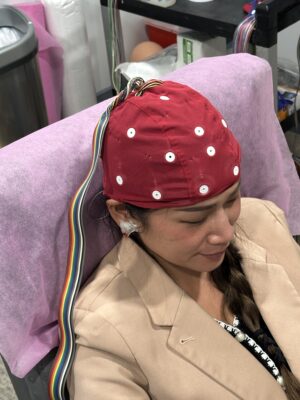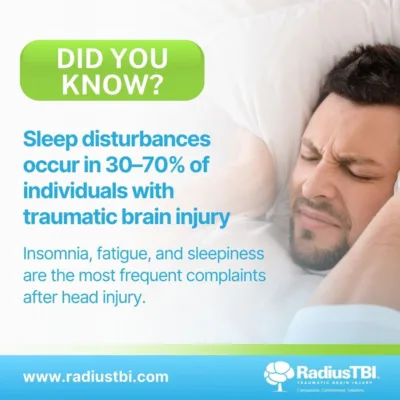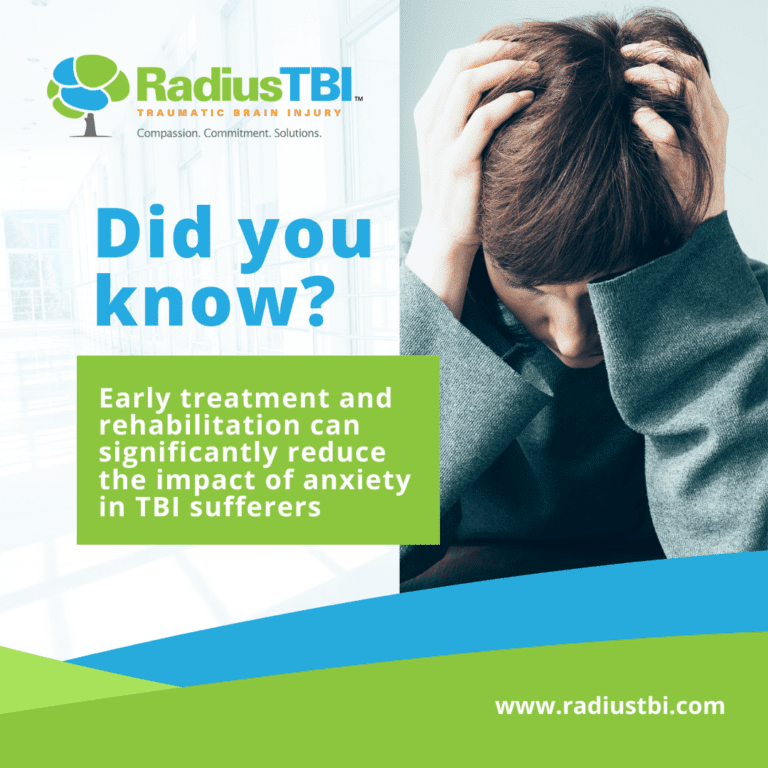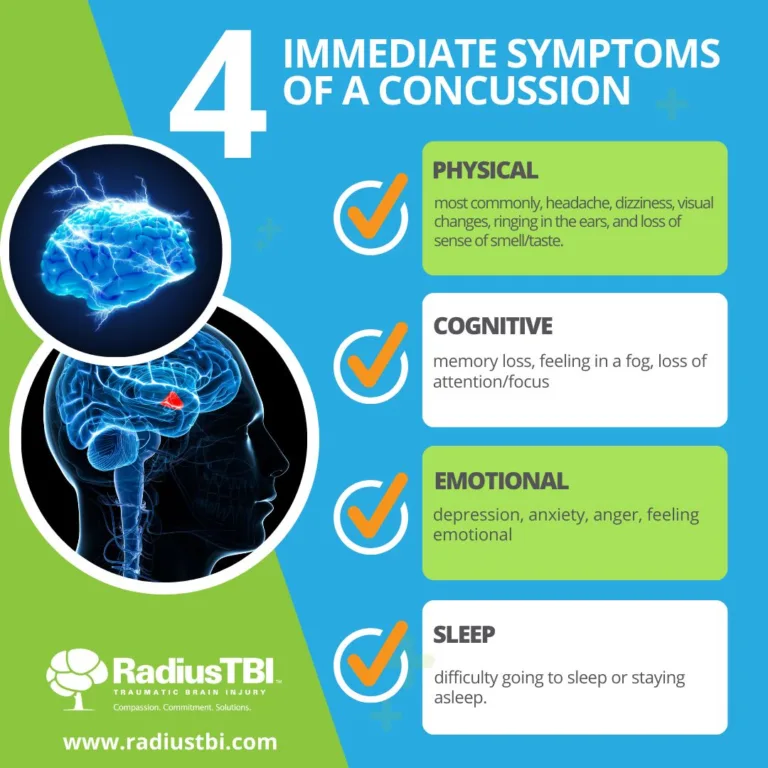Understanding Anxiety Treatment Options and Embracing Neurofeedback Therapy at Radius TBI
Anxiety is a complex mental health condition that affects millions of people worldwide, manifesting in different forms and intensities.
While occasional feelings of anxiety are normal, chronic or overwhelming anxiety can be debilitating, impacting one’s daily life, relationships, and overall well-being. In this blog, we will explore common treatment approaches for anxiety and delve into the revolutionary power of Neurofeedback therapy, offered by Radius TBI, in helping individuals regain control over their anxious minds.
Anxiety after a brain injury is a relatively common occurrence and can be attributed to various factors.
The brain is a complex organ responsible for regulating emotions, thoughts, and behaviors. When it sustains an injury, even a mild one, it can disrupt its normal functioning and lead to changes in emotions and behaviors, including anxiety.
Here are some reasons why anxiety may develop after a brain injury:
- Neurological Disruption: Brain injuries can cause damage to specific areas of the brain responsible for emotional regulation, such as the amygdala and prefrontal cortex. This disruption can lead to an imbalance in neurotransmitters and neural circuits involved in anxiety, resulting in heightened emotional responses.
- Physical Trauma and Stress: The experience of a brain injury itself can be traumatic and stressful. Physical trauma, pain, hospitalization, and recovery processes can contribute to feelings of anxiety and uncertainty about the future.
- Cognitive Impairment: Brain injuries can lead to cognitive deficits, such as memory problems, difficulties with decision-making, and impaired problem-solving abilities. These challenges may lead to increased worry and anxiety about coping with daily tasks and responsibilities.
- Changes in Self-Identity: A brain injury can bring about changes in personality, behavior, and self-identity. These changes can be distressing for the individual and may lead to anxiety about how others perceive them or how they perceive themselves.
- Fear of Re-injury: Individuals who have experienced a brain injury may develop a heightened fear of re-injury, leading to anxiety in situations that may pose even a minimal risk.
- Post-Traumatic Stress: In some cases, a brain injury can trigger symptoms of post-traumatic stress disorder (PTSD). Individuals may experience intrusive thoughts, flashbacks, nightmares, and hypervigilance, all of which can contribute to anxiety.
- Social and Emotional Challenges: Brain injuries can impact social interactions and emotional processing, making it difficult for individuals to navigate social situations and relationships. This can result in social anxiety and heightened stress in social settings.
Understanding Anxiety and Its Impact
Anxiety is characterized by persistent feelings of fear, worry, and apprehension. It can manifest as generalized anxiety disorder (GAD), panic disorder, social anxiety, phobias, or other specific anxiety-related conditions. Symptoms can vary widely, ranging from restlessness and irritability to racing thoughts, heart palpitations, and avoidance behavior.
Living with anxiety can be overwhelming, leading to impaired concentration, disrupted sleep, physical tension, and a diminished sense of joy and fulfillment. Seeking appropriate treatment is crucial to alleviate these symptoms and improve one's quality of life. Here is some Common Treatment Approaches:
- Psychotherapy: Talk therapy, such as cognitive-behavioral therapy (CBT), is a widely used approach in treating anxiety. It helps individuals identify negative thought patterns, challenge them, and develop healthier coping mechanisms.
- Medication: Antidepressants and anti-anxiety medications are prescribed in some cases to manage anxiety symptoms. These medications can provide relief, but they may also have potential side effects.
- Lifestyle Changes: Incorporating regular exercise, a balanced diet, mindfulness practices, and sufficient sleep can positively impact anxiety levels.
- Stress Reduction Techniques: Learning relaxation techniques, such as deep breathing, meditation, and yoga, can help reduce stress and anxiety.
The Role of Neurofeedback Therapy in Anxiety Treatment
Neurofeedback therapy, offered at Radius TBI, is a cutting-edge, non-invasive approach to treating anxiety that focuses on training the brain to self-regulate and optimize its functioning. Through real-time monitoring of brainwave activity, individuals gain insights into their brain's functioning and learn to make positive changes.
Neurofeedback therapy is personalized, targeting specific brainwave imbalances unique to each individual's anxiety patterns. As the brain learns and adapts, it forms new neural connections, promoting lasting improvements in emotional regulation and resilience.
How Anxiety treatment Neurofeedback Therapy Works?
During a Neurofeedback session, sensors are placed on the scalp to measure brainwave activity. The brainwave data is then displayed on a computer screen, providing visual and auditory feedback to the individual. The goal is to teach the brain to produce more desirable brainwave patterns associated with relaxation and emotional balance while reducing patterns linked to anxiety and stress.
The Benefits of Anxiety Treatment: Neurofeedback Therapy
- Non-Invasive and Drug-Free: Neurofeedback therapy is a natural approach without the need for medications, minimizing potential side effects.
- Targeted and Personalized: The therapy is tailored to each individual, focusing on their specific brainwave patterns and needs.
- Long-Lasting Effects: With consistent sessions, the brain learns and internalizes healthier patterns, resulting in enduring benefits.
- Complementary to Other Treatments: Neurofeedback can be used in conjunction with other therapies, enhancing the overall treatment effectiveness.
How Radius TBI Excels in Anxiety Treatments
Radius TBI stands out as a leader in Neurofeedback therapy, providing advanced technology and a team of skilled neurologists and professionals. Their compassionate and individualized approach ensures that each person receives personalized attention and a treatment plan optimized for their unique needs.
It is essential to recognize that anxiety after a brain injury is a valid and common response to the challenges and changes that occur during the recovery process. Seeking professional support, such as from neurologists, neuropsychologists, and mental health professionals, can be crucial in managing anxiety and providing effective coping strategies tailored to the individual's needs. Additionally, treatments like Neurofeedback therapy, as offered by Radius TBI, have shown promise in helping individuals with brain injuries address anxiety by facilitating brain regulation and emotional balance.
Latest News & Updates
Blogs

QEEG Brain Map Interpretation
In the world of neuroscience, one of the advanced tools used to understand brain function is the Quantitative Electroencephalogram (QEEG),

Meet Our No.1 Best Neuropsychologist in Tampa, FL Location
At Radius TBI, we pride ourselves on providing exceptional care for individuals suffering from traumatic brain injuries (TBI) and concussions.

Sleep Disturbance
Did you know? Dealing with a traumatic brain injury (TBI) often means navigating a range of complications, one of the






